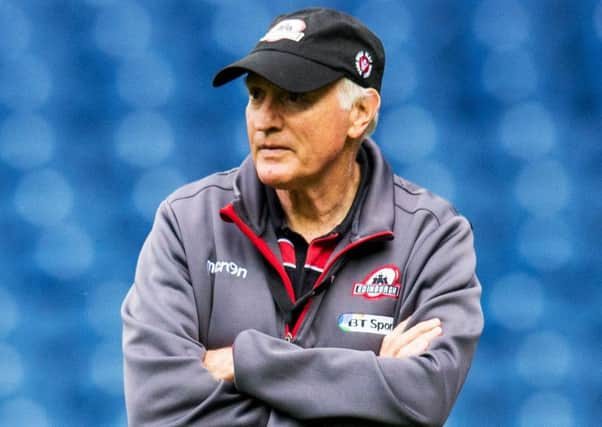Comment: Allan Massie on rugby's increased aping of football


Rugby clubs, like football ones, now source their players worldwide. Rugby hasn’t yet reached the condition of the English Premiership where fans devoutly follow a team that may field only one or two Englishmen, or even none – and, in England, the RFU’s regulation effectively forbid this. But things are different in France. It would be no surprise to see a Top 14 Final in which there were no more players eligible for France than there are fingers on a hand.
This week, the SRU thanked Alan Solomons for his work at Edinburgh and ushered him out of the door. Edinburgh have begun the season disappointingly, losing three of their first four matches. So goodbye to the manager-coach. That’s the football style. We haven’t yet in rugby succumbed to the “cult of the manager” which, in football, will see a match between the two Manchester clubs billed as a heavyweight contest between Jose Mourinho and Pep Guardiola (even though neither of these gentlemen will actually kick a ball), but we’re getting there. The first step is to hold the manager-coach responsible for success or failure, especially the latter. A disappointing season saw Bath dismiss Mike Ford this summer, and, commentators on a couple of Toulon’s games this new season have spent more time speculating on the chances of new coach Diego Dominguez being dismissed if they lose again rather than actually identifying players carrying the ball or making tackles. Incidentally, Ford, in true footballing style, has resurfaced as Dominguez’s assistant and possible replacement.
Advertisement
Hide AdAdvertisement
Hide Ad“Blame the manager” is the cry of football fans and journalists, even though one unusually brave scribe remarked in the context of Sam Allardyce’s self-inflicted departure that, over the years, every English failure in an international tournament has seen the manager sacked while the players who actually failed to put the ball in the opposition net, or keep it out of their own, remain. It wasn’t Roy Hodgson who lost to Iceland, just as it wasn’t Alan Solomons who lost to Cardiff, Leinster and Munster. In football, the manager is guilty, the players innocent. Are we heading that way in rugby? I’m afraid we are. Conversely, when things go right, the manager gets the plaudits. Brendan Rodgers “masterminded” Celtic’s notable draw with Manchester City; but it was the players who showed courage and flair.
This week, the SRU took another step towards the condition of football by inviting investment in Edinburgh and Glasgow. One understands why. Salary bills rise. Running a professional rugby club becomes more expensive each year. Neither Glasgow nor Edinburgh – that is, the SRU – can afford to match salaries in France and England. Scottish players may choose to remain here, for the time being anyway, but imports will always be tempted, understandably, to move on. In any case, the SRU has obligations to all the amateur clubs who, in fact, constitute the Union. So off-loading the cost, or a good part of the cost, of running the two professional clubs makes financial sense. It may even, in the short run anyway, make rugby sense, if the right investors or buyers come along.
But (there is always a but) it is again worth looking at Scottish football where, in comparison with the English Premiership, all Scottish clubs play, as it were, every match uphill (in both halves) and into a howling gale. They are poor relations, very poor relations. Celtic are by some way the best and most successful club here, partly perhaps because they can afford to buy better foreigners than their Scottish rivals. But in the wider pool, they are now very small fish, and one of the reactions to their fine performance this week was instructive. How long, it was asked, can they keep brilliant young striker Moussa Dembele? Will he go south in the January transfer window or not till next summer?
Of course, much may depend on what conditions the SRU attach to any investment or sale. If they retain a fair measure of control, they might be able to insist that the clubs field a certain number of Scottish or Scottish-qualified players. It would probably, at first anyway, be in the interest of the new investors/owners to do this in any case. Glasgow can fill Scotstoun now, but I doubt if fans’ loyalty to the club is sufficiently entrenched (as the loyalties of football fans evidently are) to turn out to support a team made up of imports. Nevertheless, the day may come when scarcely anyone in the Scotland XV plays his club rugby in Scotland. Just like football again.